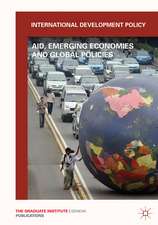State Transformations in OECD Countries: Dimensions, Driving Forces, and Trajectories: Transformations of the State
Editat de H. Rothgang, Steffen Schneideren Limba Engleză Hardback – 20 mar 2015
| Toate formatele și edițiile | Preț | Express |
|---|---|---|
| Paperback (1) | 388.34 lei 6-8 săpt. | |
| Palgrave Macmillan UK – 2015 | 388.34 lei 6-8 săpt. | |
| Hardback (1) | 392.97 lei 6-8 săpt. | |
| Palgrave Macmillan UK – 20 mar 2015 | 392.97 lei 6-8 săpt. |
Din seria Transformations of the State
- 15%
 Preț: 583.61 lei
Preț: 583.61 lei -
 Preț: 391.61 lei
Preț: 391.61 lei -
 Preț: 391.61 lei
Preț: 391.61 lei -
 Preț: 389.88 lei
Preț: 389.88 lei -
 Preț: 390.63 lei
Preț: 390.63 lei - 15%
 Preț: 701.40 lei
Preț: 701.40 lei -
 Preț: 389.88 lei
Preț: 389.88 lei - 15%
 Preț: 641.85 lei
Preț: 641.85 lei -
 Preț: 388.72 lei
Preț: 388.72 lei - 15%
 Preț: 695.70 lei
Preț: 695.70 lei -
 Preț: 393.52 lei
Preț: 393.52 lei -
 Preț: 389.70 lei
Preț: 389.70 lei -
 Preț: 390.63 lei
Preț: 390.63 lei -
 Preț: 388.72 lei
Preț: 388.72 lei - 15%
 Preț: 470.72 lei
Preț: 470.72 lei -
 Preț: 390.63 lei
Preț: 390.63 lei -
 Preț: 389.11 lei
Preț: 389.11 lei -
 Preț: 394.87 lei
Preț: 394.87 lei -
 Preț: 389.70 lei
Preț: 389.70 lei -
 Preț: 387.75 lei
Preț: 387.75 lei -
 Preț: 380.63 lei
Preț: 380.63 lei -
 Preț: 383.12 lei
Preț: 383.12 lei -
 Preț: 388.90 lei
Preț: 388.90 lei - 15%
 Preț: 703.38 lei
Preț: 703.38 lei - 15%
 Preț: 643.34 lei
Preț: 643.34 lei - 15%
 Preț: 644.18 lei
Preț: 644.18 lei -
 Preț: 389.88 lei
Preț: 389.88 lei - 15%
 Preț: 641.71 lei
Preț: 641.71 lei -
 Preț: 389.70 lei
Preț: 389.70 lei -
 Preț: 391.02 lei
Preț: 391.02 lei -
 Preț: 387.75 lei
Preț: 387.75 lei -
 Preț: 388.90 lei
Preț: 388.90 lei -
 Preț: 389.70 lei
Preț: 389.70 lei
Preț: 392.97 lei
Nou
Puncte Express: 589
Preț estimativ în valută:
75.20€ • 79.07$ • 62.13£
75.20€ • 79.07$ • 62.13£
Carte tipărită la comandă
Livrare economică 17 aprilie-01 mai
Preluare comenzi: 021 569.72.76
Specificații
ISBN-13: 9781137012418
ISBN-10: 1137012412
Pagini: 317
Ilustrații: XIV, 317 p.
Dimensiuni: 140 x 216 x 19 mm
Greutate: 0.53 kg
Ediția:2015
Editura: Palgrave Macmillan UK
Colecția Palgrave Macmillan
Seria Transformations of the State
Locul publicării:London, United Kingdom
ISBN-10: 1137012412
Pagini: 317
Ilustrații: XIV, 317 p.
Dimensiuni: 140 x 216 x 19 mm
Greutate: 0.53 kg
Ediția:2015
Editura: Palgrave Macmillan UK
Colecția Palgrave Macmillan
Seria Transformations of the State
Locul publicării:London, United Kingdom
Cuprins
PART I: INTRODUCTION 1. Explaining State Transformations: A Framework; Steffen Schneider and Heinz Rothgang PART II: RESOURCE DIMENSION: THE TERRITORIAL STATE 2. The Rise and Decline of Public Enterprises in Western Democracies; Carina Schmitt and Herbert Obinger 3. The Competing State: Transformations of the Public/Private Sector Earnings Gap in Four Countries; Markus Tepe, Bernhard Kittel and Karin Gottschall 4. The Evolving Post-national Regulation of Financial Reporting; Jörg R. Werner and Jochen Zimmermann PART III: LEGAL DIMENSION: THE RULE OF LAW 5. The Effects of International Dispute Settlement Procedures; Aletta Mondré 6. Internationalizing Law against the Odds: The Power of Courts and Their Limits; Susanne K. Schmidt, Michael Blauberger and Tilman Krüger 7. Explaining the Transnationalization of Commercial Law; Gralf-Peter Calliess, Hermann B. Hoffmann and Jens Michael Lobschat PART IV: LEGITIMACY DIMENSION: DEMOCRACY 8. Cultures of Political Discourse in Europe: Explaining Multiple Segmentation in the European Public Sphere; Andreas Hepp, Katharina Kleinen-von Königslöw, Swantje Lingenberg, Johanna Möller, Michael Brüggemann and Anke Offerhaus 9. Internationalization and the Discursive Legitimation of the Democratic Nation State; Sebastian Haunss, Henning Schmidtke and Steffen Schneider PART V: WELFARE DIMENSION: STATE INTERVENTION 10. Pioneers of Paradigmatic Change? Welfare State Restructuring in Small Open Economies; Peter Starke and Herbert Obinger 11. Policy Change in Secondary Education: Germany and England Compared; Philipp Knodel, Kerstin Martens and Dennis Niemann 12. The Hybridization of Healthcare Regulation: An Explanation in Cross-national Perspective; Lorraine Frisina Doetter, Ralf Götze, Achim Schmid, Mirella Cacace and Heinz Rothgang PART VI: CONCLUSION 13. The Democratic Nation State: Victim or Master of Transformations?; Steffen Schneider and Heinz Rothgang
Notă biografică
Michael Blauberger, University of Salzburg, AustriaMichael Brüggemann, University of Zurich, SwitzerlandMirella Cacace, University of Bremen, GermanyGralf-Peter Calliess, University of Bremen, GermanyLorraine Frisina Doetter, University of Bremen, GermanyKarin Gottschall, University of Bremen, GermanyRalf Götze, University of Bremen, GermanySebastian Haunss, University of Bremen, GermanyAndreas Hepp, University of Bremen, GermanyHermann B. Hoffmann, CMS Hasche Sigle, Berlin, GermanyBernhard Kittel, University of Vienna, AustriaKatharina Kleinen-von Königslöw, University of Vienna, AustriaPhilipp Knodel, University of Bremen, GermanyTilman Krüger, University of Bremen, GermanySwantje Lingenberg, University of Bremen, GermanyJens Michael Lobschat, University of Bremen, GermanyKerstin Martens, University of Bremen, GermanyJohanna Möller, University of Bremen, GermanyAletta Mondré, University of Duisburg-Essen, GermanyDennis Niemann, University of Bremen, GermanyHerbert Obinger, University of Bremen, GermanyAnke Offerhaus, University of Bremen, GermanyAchim Schmid, University of Bremen, GermanySusanne K. Schmidt, University of Bremen, GermanyHenning Schmidtke, University of Bremen, GermanyCarina Schmitt, University of Bremen, GermanyPeter Starke, University of Southern Denmark, DenmarkMarkus Tepe, University of Oldenburg, GermanyJörg R. Werner, Frankfurt School of Finance and Management, GermanyJochen Zimmermann,University of Bremen, Germany
















